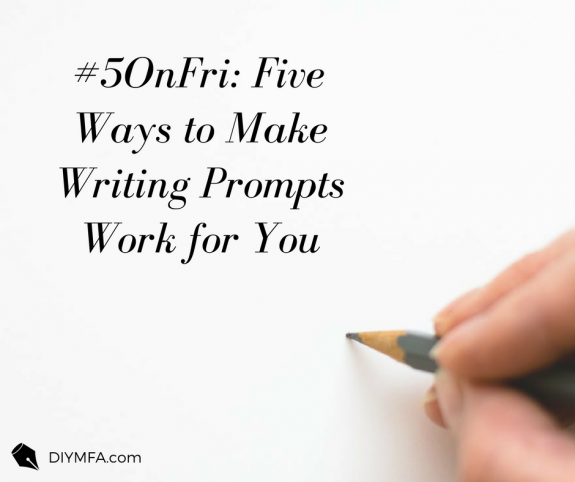Writing prompts can be a powerful tool to jumpstart our writing, but they can also feel like a waste of time…if we don’t approach them with purpose.
Here are five ways you can make writing prompts work for you, whether you are blocked, are in the middle of a work-in-progress or simply want to write more.
1) Breaking Through Blocks
Writing blocks are often caused by fear: “what if I can’t write anything good?” Short-circuit this by using a ridiculous prompt that almost promises to prevent you from writing anything good.
For example, look for lists of words you must incorporate into the story, or random collections of settings and characters to combine into a story. These silly prompts lower the stakes and allow you say to yourself, “well, it probably won’t be good, but it’ll be fun.”
Prompts like these get your started, teach you about about your ability to work, remind you of the joy of putting words together, and give you a chance to practice the craft.
Here are some word-list writing prompts from StoryADay.org and the DIYMFA Writer Igniter writing prompt tool.
2) Using Journal Prompts Effectively
Journal or ‘free-writing’ doesn’t tend to produce a novel, but it can get the whirling ‘day job’ thoughts out of your heads, freeing you to listen to the ‘story voices’ you are straining to hear.
Set a timer for 25 minutes, or aim for 750 words, and go. Pick a prompt from lists of memoir-like questions (see below) or write about what’s worrying you. Even if you have to write “this is stupid. I don’t know what to write”, keep going.
At some point you will break through the inanity and find your flow, or exorcise the demons that are keeping you from moving on with your work.
Journal prompts are easy to find online. They tend to ask questions about you, your fears, your concerns or your memories. Remember, you never have to show this writing to anyone. Here are some writing prompts for journalling
3) If You Want To Write A Short Story
The kinds of prompts that work for breaking blocks or for journal entries won’t help when you’re trying to craft a story.
Stories need structure. That structure grows out of a question relating to a particular character, and a challenge they face. An interesting character has needs, desires, fears, beliefs, misapprehensions, a past…in short: baggage. To help you build this character’s story you need more than a random collection of words, events, or props.
Commonly-used story prompts—an overheard conversation, an intriguing image, a curious ‘what if’—can work as sparks for your story, but only if you think about them in the right way: why would the ‘what if’, or the overheard conversation matter to your very particular character? What would it change for them? What would it upset about their worldview. What would it put at risk?
If a prompt doesn’t lead you to a character who would be personally impacted, for specific reasons, in interesting ways, find another prompt.
Remember short stories are limited: very few characters, very few settings, one big moment. If a prompt suggests a whole world of story questions, it is not a good short story prompt!
Here are some writing prompts designed to spark short stories.
4) If You Want To Work On Your Novel-In-Progress
You might not want to ‘waste’ time on writing prompts that take you away from your work-in-progress. So, use them to investigate the surrounding world of your novel, in ways that make it easier to write the main trunk of the story, later. Or use writing prompts to create the next part of your novel.
One of the easiest way to stall on a novel, is to know too little about the backstory or surrounding ‘world’. (And yes, this is an issue in contemporary, realistic fiction, as well as in fantasy!) Use writing prompts to delve into these worlds.
Write about incidents in your character’s childhood that lead to her inner demons. Write about the external challenges your character is facing, and why they developed in this society, and at this moment. Write a scene from another character’s point of view (especially your antagonist).
These exercises won’t make it into your novel unchanged, but they will keep you pushing the story forward.
Alternatively, you can use prompts to write the seed of a new scene. Look for prompts that push you to examine a character’s motivation, or that encourage you to focus on a specific type of scene (an action scene, a scene full of feedback from all five senses, a dialogue-heavy scene). Set a timer or a word limit and aim to work on only that skill. Doing this allows you to forget about the (sometimes crushing) weight of the novel around the scene, and simply write. Here are some examples of writing prompts that focus on craft..
5) If You Don’t Want To Waste Your Time
You are more likely to be productive when you know what you want to achieve.
Think about your purpose in writing today. Are you breaking through blocks, clearing your head, writing a story, working on your novel, or something else? Make sure the prompt you choose suits your aims, as I illustrated above.
Next, make sure the prompt you choose is neither too vague nor too specific. If it’s too vague, you will be paralyzed by the endless possibilities. Too specific, and you may write a scene in which a bunch of things happen, but none of it matters. (This is fine if you’re using the prompt to break blocks, but not if you want to make progress on a short story or novel.)
When you discover a cache of writing prompts, read through them all quickly, making a mental note of the ones that tug at something inside you. Then go back to the most powerful of those, find one that aligns with your purpose, and begin writing.
Better still, start creating lists of prompts for yourself. Use questions you have about your characters or novel-world; create lists of nouns (as Ray Bradbury used to do, claiming that each of them was triggered by something deep inside his subconscious, that he then explored in his writing story); keep a list of things that frighten you, or that give you joy; things that enrage you and things that you don’t understand other people being enraged about; words you like the sound of; words with double meanings…you get the idea.
Then, set a timer and get writing!
Do you have a favorite source for writing prompts? How do you shake ideas loose when you want to write?
 Julie Duffy is the founder and director of the StoryADay May challenge and online community. Her short stories have been published in print anthologies and online. She gives online and in-person workshops about writing, and releases an annual ebook collection, A Month of Writing Prompts. You can follow her on Facebook and find her on Twitter @storyadaymay.
Julie Duffy is the founder and director of the StoryADay May challenge and online community. Her short stories have been published in print anthologies and online. She gives online and in-person workshops about writing, and releases an annual ebook collection, A Month of Writing Prompts. You can follow her on Facebook and find her on Twitter @storyadaymay.







